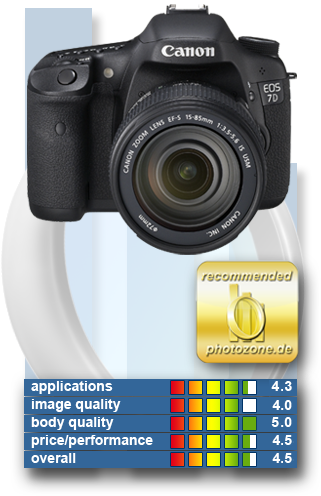|
Canon EOS 7D Review / Test Report - Verdict |
|
DSLR Reviews -
DSLRs
|
|
Friday, 29 January 2010 00:00 |
|
Page 9 of 9

Verdict

We've waited quite a while for the release of a digital EOS 3 and the new EOS 7D comes darn close here - it's a true professional grade DSLR based on an APS-C sensor. The build quality of the camera is superb thanks to a metal construction with additional seals against dust and humidity. The AF performance is great both in daylight as well as in dark light conditions and it's suppored by a correspondingly high processing speed with up to 8 fps. The exposure accuracy of the new metering system is very good as well although not foolproof but then no system is here. It's a joy to handle the camera with all the knobs and
buttons in the right places and the large and bright viewfinder with super-imposable grid lines is really an improvement over previous generations. The high resolution 3" LCD screen is also as good as it gets these days. Live-View users may miss an articulated screen like on the Olympus E-3 but other than
that it leaves nothing to be desired here. HD movie support has been high on the agenda in 2009 and the 7D does not disappoint here with its 1080p@30fps/720p mode. While the movie quality is outstanding compared to camcorders (with their tiny image sensors) it does still feel a little alien on a DSLR - to me at least.
If anything the biggest weakness of the camera is the APS-C sensor - I reckon most of us hoped for a full format sensor (although the author's vote would have been on APS-H aka 1.3x) but price-wise this would have pushed the camera beyond the EOS 5D II. Anyway, this doesn't mean that the sensor is bad - it is not. At 18mp it is the highest resolution APS-C sensor to date. That's surely a nice marketing argument
but in the real life most lenses do already struggle to match the resolution of the "old" 15mp sensor used in the EOS 50D and we measured only a comparatively marginal increase in effective resolution using our Zeiss benchmark lens. Despite the very high pixel density Canon managed to keep the dynamic range (DR) on par with the more conventional 12mp Sony sensors used e.g. in the current Nikon DSLRs a la D300s - that's
quite an achievement actually when considering the DR problems in the current 4/3 DSLRs with their similar pixel density. Canon used to be reknowned for low noise at high ISO settings. While this is still valid when considering similar print sizes (compared to other APS-C DSLRs) things are starting to get ugly beyond ISO 1600 in technical terms (on pixel level, less so on prints). So if you're looking for a superior image quality you still have to to bite the bullet a go for a full format DSLRs.
That all said the EOS 7D is the most sophisticated and best APS-C DSLR tested to date and consequently it does qualify for our highest praise - highly recommended!
| Pros and Cons |
| Pros | Cons |
| outstanding build quality | "average" high-ISO performance |
| excellent handling | no articulated LCD screen |
| high resolution combined with decent dynamic range | AWB (auto-white balancing) could be better in artificial light conditions |
| excellent AF | high requirements towards lens quality |
| superb viewfinder (for an APS-C DSLR) inc. super-imposable grid lines | |
| big and bright 3’’ display with 920.000 dots | |
| full HD (1080p @ 30 fps) movie mode | |
| dual axis electronic level | |
| excellent battery life | |
|